 Petzlover
Petzlover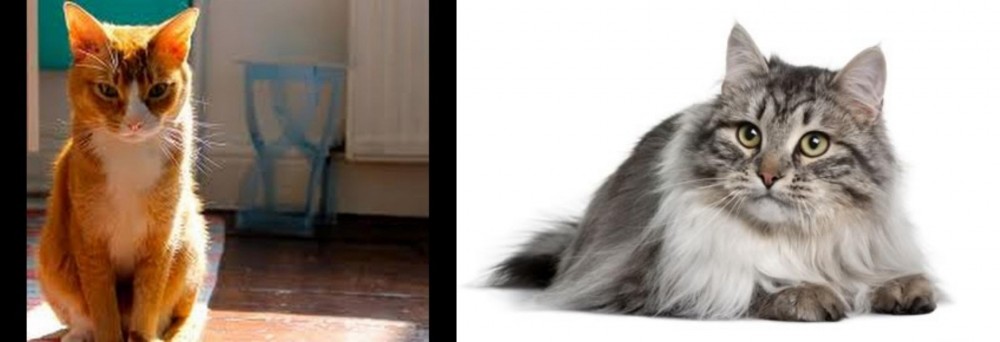 Chausie is originated from Egypt but Siberian is originated from Russia. Both Chausie and Siberian are having almost same weight. Both Chausie and Siberian has almost same life span. Both Chausie and Siberian has same litter size. Chausie requires Low Maintenance. But Siberian requires Moderate Maintenance
Chausie is originated from Egypt but Siberian is originated from Russia. Both Chausie and Siberian are having almost same weight. Both Chausie and Siberian has almost same life span. Both Chausie and Siberian has same litter size. Chausie requires Low Maintenance. But Siberian requires Moderate Maintenance
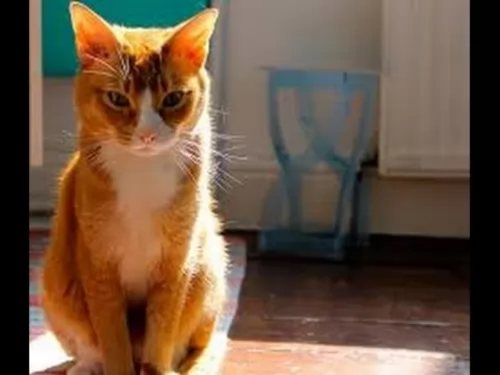 The Afro-Chausie came about from breeding a few individuals from a species of jungle cat which was native to India, Asia and the Middle East. In other words, this is a cross between a wild cat and a domesticated cat.
The Afro-Chausie came about from breeding a few individuals from a species of jungle cat which was native to India, Asia and the Middle East. In other words, this is a cross between a wild cat and a domesticated cat.
It was only in 1995 that the Chausie was recognized as a domestic breed, and by the International Cat Association.
The Chausie breed essentially began in the 1990s, when breeders name the breed Chausie and also developed a breeding program. They received registration status in 1995. Chausies are bred in North America and Europe and in 2003 became a new breed in the United States.
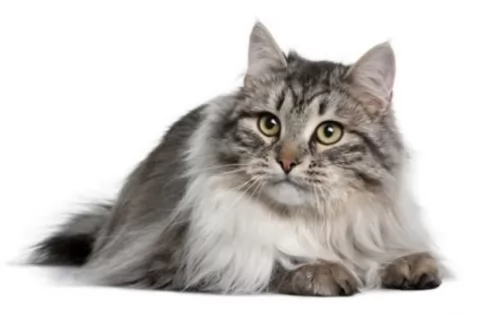 The beautiful Siberian cat originated from Russia, a very cold area which explains his thick coat.
The beautiful Siberian cat originated from Russia, a very cold area which explains his thick coat.
This is a natural variety of domestic cat. It is an ancient breed and it is believed that it is ancestral to all modern long-haired cats.
The Siberian is the national cat of Russia. The cat first arrived in the United States in 1990.
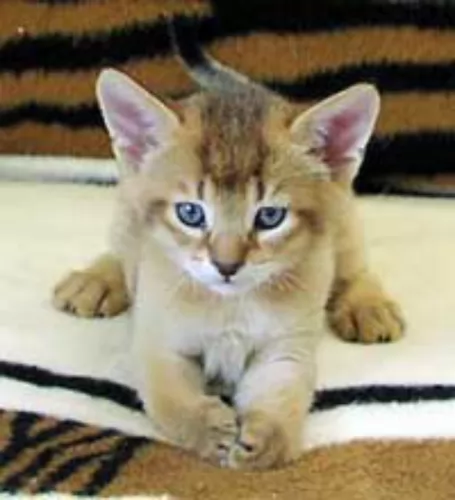 The Chausie is a medium to large cat with a long body and long legs. In fact, the hind legs are somewhat longer than their front legs, and they’re able to easily leap into the air and up onto high perches. Some people say these cats look like Pumas.
The Chausie is a medium to large cat with a long body and long legs. In fact, the hind legs are somewhat longer than their front legs, and they’re able to easily leap into the air and up onto high perches. Some people say these cats look like Pumas.
The adult Afro-Chausie can weigh between 5 to 9kg and they stand in height from 35cm to 45cm and sometimes taller, both male and female.
The ears of the cat are broad and tall and the almond-shaped eyes are a yellow to green shade. The TICA Chausie breed standard says that the cat comes in 3 colors – a black/brown ticked coats, solid black and black grizzled tabby, but in fact, they come in quite a few other colors and patterns too.
Your Afro-Chausie is an intelligent, loyal, social and athletic cat that is also playful. They love their human companions and will form a deep bond with them, making it difficult to rehome him later on.
They don’t like being alone, in fact to such an extent that they will befriend dogs in the home too. This is such an active cat and you can even train him to walk on a leash.
It’s a cat that also loves water and Similar to Bengals and Savannahs, this breed, too, enjoys water. This cat will form deep bonds with owners, hence rehoming has been known to be particularly challenging with this breed
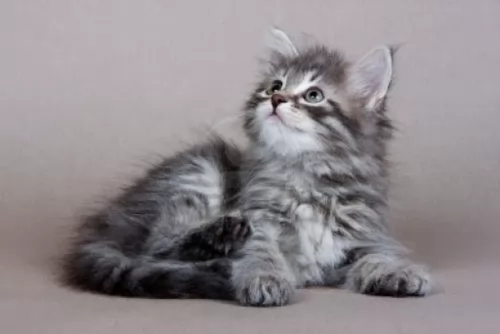 The Siberian is a medium to large-sized cat that weighs between 3 and 7kg. They are known to be excellent jumpers.
The Siberian is a medium to large-sized cat that weighs between 3 and 7kg. They are known to be excellent jumpers.
It is a powerfully built cat with large paws and a full tail. The ears are medium in size with large round eyes. The cat has a slight arch to its back as the hind legs are a bit longer than the front legs.
The glossy coat is in three layers to protect it from extreme weather conditions. It comes in different colors such as tortoiseshell, colorpoint, tabby, and solid. He sheds a couple of times a year.
The Siberian cat is highly affectionate with family and playful too. In spite of that, he also loves curling up close to where his humans are.
This friendly cat will want to follow you and be where you are. They’re intelligent and can be taught a few tricks. Because they’re athletic, it will be a good idea to buy him a climbing tree as he loves to leap up to a perch and watch things going on. He gets on well with children and other pets.
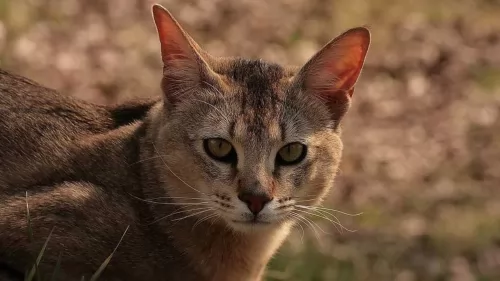 The Chausie loves human contact and they love games with their human family.
The Chausie loves human contact and they love games with their human family.
They’re intelligent and are constantly looking for things to do. They are athletic and have plenty of energy. They’re social, playful and make great playmates for children who have been taught to respect animals.
When you bring an Afro-Chausie into your home, you can expect to have a lot of action and entertainment with this beautiful cat.
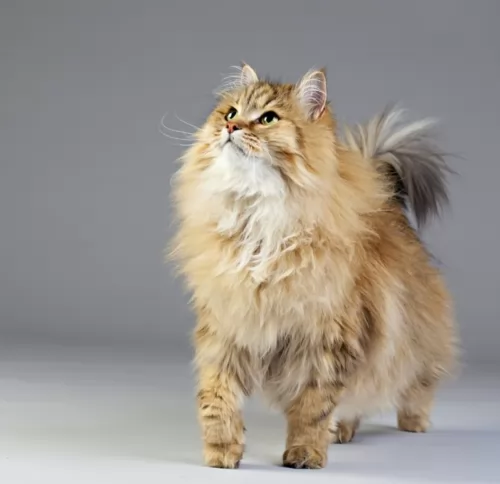 Your Siberian loves to climb and explore and to keep this gorgeous cat mentally stimulated and physically active, provide him with some fun toys that require him to think.
Your Siberian loves to climb and explore and to keep this gorgeous cat mentally stimulated and physically active, provide him with some fun toys that require him to think.
They are nice and strong these cats as well as being curious and alert and you see this in the bright, shiny eyes.
They’ve got easygoing personalities and are also considered fairly low maintenance cats, making them the perfect choice for any cat lover.
They are devoted and loyal to their human family and one of these cats in your home is guaranteed to bring in joy, entertainment, fun, and solid companionship.
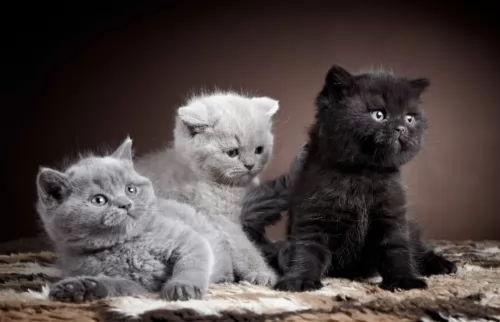 With good health, your Afro Chausie can live to be anything between 12 – 16 years of age. These cats are prone to developing food allergies, and this is why it is important to feed your Chausie high-quality food.
With good health, your Afro Chausie can live to be anything between 12 – 16 years of age. These cats are prone to developing food allergies, and this is why it is important to feed your Chausie high-quality food.
They’ve got fragile digestive systems and many are gluten intolerant.
All kinds of parasites can invade your Afro-Chausie’s body – internally and externally so be sure to have your Chausie checked over for parasites such as tick and fleas, worms and mites.
Check your Chausie for putting on too much weight as these cats have a huge appetite.
You just have to bear in mind that these cats can develop any of the illnesses that other domesticated cats get
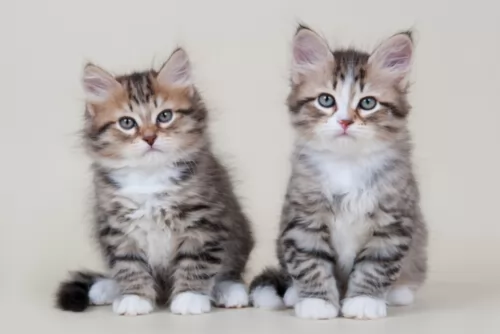 Siberian cats can succumb to stomach issues such as IBS. If you think your Siberian is in pain, he will need a visit to the vet. These cats are also susceptible to some hereditary health issues such as hypertrophic cardiomyopathy. If you buy a kitten, make sure you get your kitten from a reputable source.
Siberian cats can succumb to stomach issues such as IBS. If you think your Siberian is in pain, he will need a visit to the vet. These cats are also susceptible to some hereditary health issues such as hypertrophic cardiomyopathy. If you buy a kitten, make sure you get your kitten from a reputable source.
To ensure the best health for your Siberian, he will need high-quality cat food. High-quality food can actually prevent many health issues in the cat. A good idea will be to feed your Siberian vet-recommended food and in the right portions to keep him at the ideal weight.
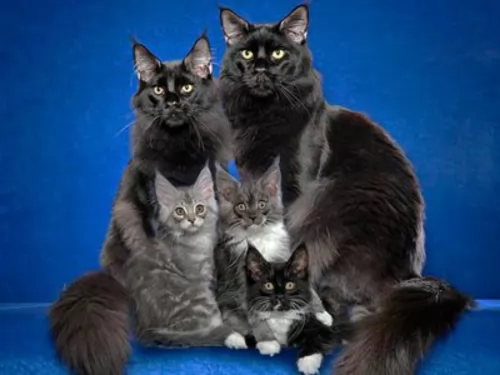 With their short coats, they only need to be brushed once a week as they are moderate shedders.
With their short coats, they only need to be brushed once a week as they are moderate shedders.
Provide your cat with a quiet place to sleep and which is comfortable and dry.
A cat tree can be useful for allowing your cat to climb and scratch.
Chausies are essentially meat-eaters. They don’t want to eat fruit and nuts. One of the Chausie’s ancestors was a wild cat and this is why they don’t eat the same foods as what your dog does.
Every cat thrives on a high-protein, low-carbohydrate diet. A dog’s diet with scraps from the table as well as human food can be fatal for your Chausie if it becomes your cat’s regular food.
He requires a diet of quality meat – beef, chicken, fish and organs – all foods that are easily digestible for your cat. Cats also need taurine from muscle meat such as shellfish and fish.
Always make sure your Chausie has access to a constant supply of fresh, cool water.
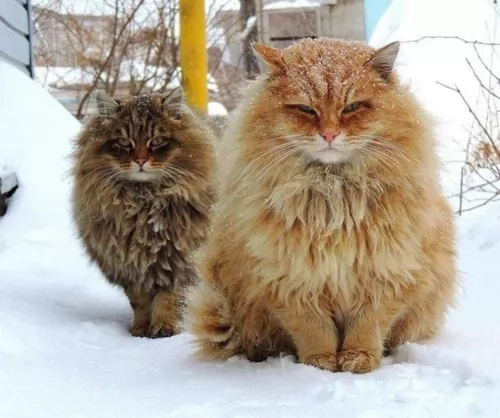 Prepare your home for the arrival of your Siberian cat. Cats are natural climbers and scratchers and he will need a scratching post, climbing tree, litter box, food and water bowls, bed as well as collar and tag. Also, invest in a large cat carrier, as your cat will need to be transported safely to the vet at certain times.
Prepare your home for the arrival of your Siberian cat. Cats are natural climbers and scratchers and he will need a scratching post, climbing tree, litter box, food and water bowls, bed as well as collar and tag. Also, invest in a large cat carrier, as your cat will need to be transported safely to the vet at certain times.
Provide toys for your Siberian cat. They’re intelligent and you don’t want to have him bored and listless. They need mental and physical stimulation so it will be fun to invest in some puzzle games for your pet.
Siberians have lovely thick coats and you want the right grooming accessories to brush him so that the coat doesn’t get dull and tangled. He will need to be brushed once or twice a week, especially when he sheds.
Keep your Siberian healthy by seeing he gets to the vet when he is sick. Also, if he is a kitten, he will need his vaccines. He will need to be checked over for parasites too – ticks, fleas, and worms, more so if he is an outdoor cat.
Trim your Siberian's nails as needed and also check the inside of his ears for signs of redness, dirt, and wax buildup as well as unpleasant odors. Many cat owners don’t like to probe around inside a cat’s ears as it can be damaging if you don’t know what you’re doing. Rather ask your vet to do it for you.
The vet can also check your cat’s teeth for signs of infection. Many people recommend cleaning the cat's teeth with a brush and cat toothpaste but this can be most traumatic for a cat and your pet groomer or vet can rather check his teeth for you.